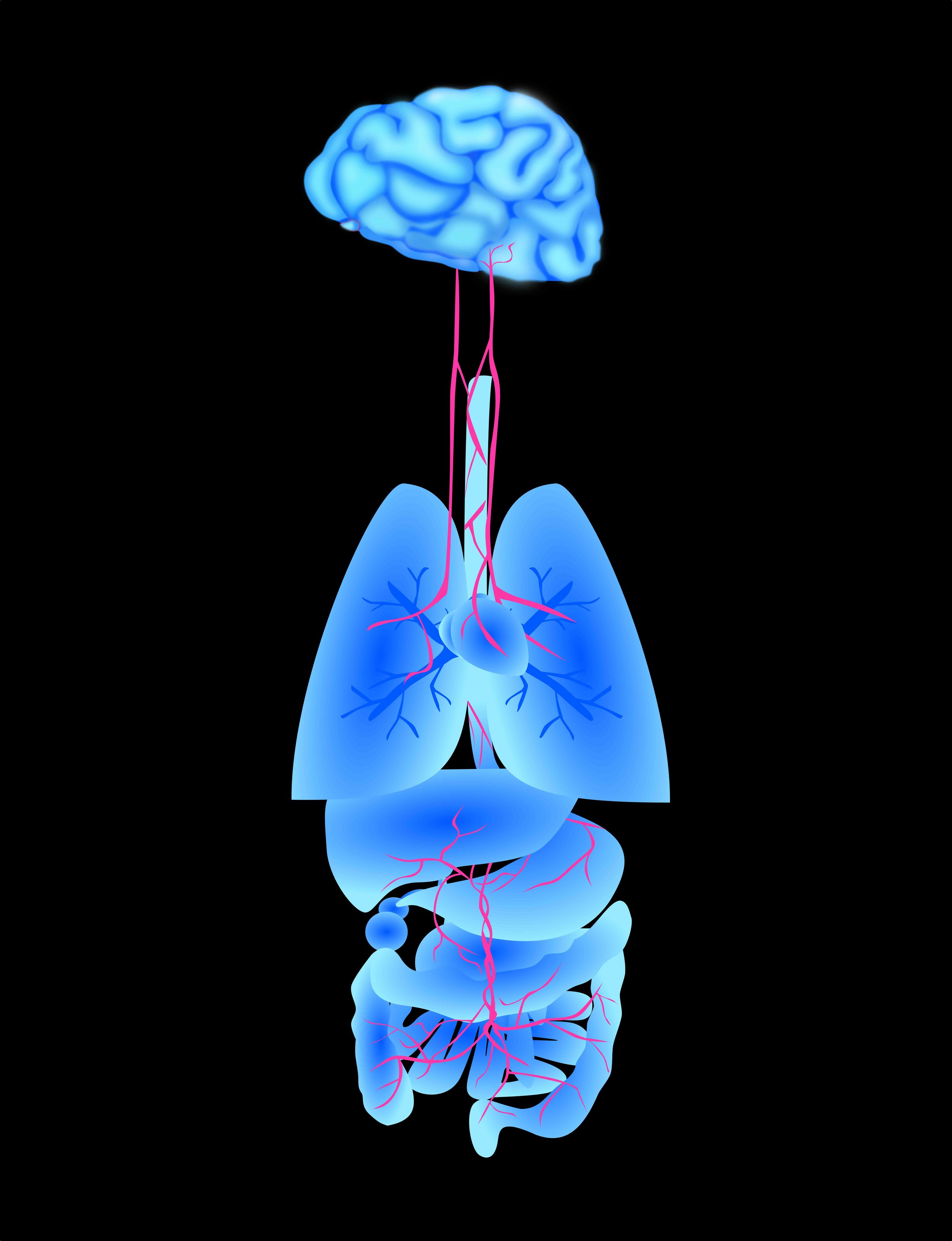Viva the Vagus Nerve!
Imagine a nerve named 'vagus' after the Latin word for 'wandering.' True to its name, this nerve embarks on an extraordinary journey, serving as a bi-directional communication pathway between the brain and major body organs. When not functioning properly, vagus nerve disorders can cause anxiety, digestive issues, and a host of other symptoms, from fatigue to heart irregularities.
In this article, you’ll learn why the health of the vagus nerve is so important as I delve into the signs of vagus nerve dysfunction, root causes, and share valuable tips on how to restore equilibrium.
CONTENTS
> WHAT IS THE VAGUS NERVE?
> A NOTE ON POLYVAGAL THEORY
> 10 SIGNS & SYMPTOMS OF VAGUS NERVE DYSREGULATION
> WHAT CAUSES VAGUS NERVE DYSFUNCTION?
> WHAT DOES A HEALTHY VAGUS NERVE FEEL LIKE?
> HOW TO IMPROVE YOUR VAGAL TONE
> CONCLUSION
WHAT IS THE VAGUS NERVE?
The vagus nerve is the 10th cranial nerve, it arises from the brain stem and runs through the ears, throat, heart and digestive system.
It is a major component of the parasympathetic nervous system - the restorative, rest-and-digest nervous system state.
You can think of it as a bi-directional communication pathway that sends sensory information between the major organs and the brain.
It regulates physiological bodily processes, like digestion and heart rate and profoundly impacts our emotional state.
Join me for the VAGUS NERVE REVIVAL program
Hi, I'm Camille Hoffman, a registered naturopath & nutritionist helping people around the world overcome chronic health issues.
During this 3-week transformation grounded in science, I will guide you step-by-step using a combination of nutritional recommendations, physical stimulation, breathing techniques & self-reflection that nourish, tone and stimulate the vagus nerve.
You will learn simple ways to quickly ease acute symptoms as well as engage in deeper practices to get to the heart of your vagus nerve imbalances, and bring it back into balance for good.
Learn more about the online program HERE
A NOTE ON POLYVAGAL THEORY
In the early 1990s, Steven Porges, Ph.D. introduced the Polyvagal Theory, revolutionizing our comprehension of the nervous system. This theory offers a comprehensive framework for understanding how our autonomic nervous system shapes our reactions to stress, social interactions, and safety. It reveals a complexity beyond the binary "fight or flight" and "rest and digest" states. Instead, it highlights a hierarchical evolution of three critical states: the ventral vagal, sympathetic, and dorsal vagal states. The ventral vagal state promotes safety and social bonding, the sympathetic state readies us for action during threats, and the dorsal vagal state leads to immobilization and shutdown. Porges emphasizes the pivotal role of these states in influencing our emotional and physiological responses, advocating for self-regulation and social connections to enhance health and resilience. Many practitioners consider this theory the missing link in helping patients overcome chronic health issues and live a more stable, energized, happy, resilient life…thank you Steven!
10 SIGNS & SYMPTOMS OF VAGUS NERVE DYSREGULATION
POOR STRESS TOLERANCE: Difficulty managing stress, which can manifest as over-reacting to small problems or an inability to relax.
Gastrointestinal Distress: Such as bloating, gas, or abdominal pain.
Constipation or Diarrhea: Irregular bowel movements due to altered digestive function.
FATIGUE: A persistent feeling of tiredness and low energy levels.
ANXIETY & MOOD SWINGS: Experiencing increased anxiety, mood fluctuations, or even depression.
HEART RATE IRREGULARITIES: Including palpitations, feeling of a racing heart, and reduced or elevated fast heart rate.
DIFFICULTY SWALLOWING: Feeling as if food gets stuck in the throat or experiencing discomfort when swallowing.
VOICE CHANGES: Such as hoarseness or difficulty speaking.
CHRONIC TENSION OR PAIN: Particularly in the neck, shoulders, or back.
SLEEP DISTURBANCES: Difficulty falling asleep, staying asleep, or experiencing restful sleep.
MEMORY AND COGNITIVE PROBLEMS: Difficulty with memory, concentration, or "brain fog."
This Photo by Unknown Author is licensed under CC BY
WHAT CAUSES VAGUS NERVE DYSFUNCTION?
Vagus nerve dysfunction can result from various factors, including:
CHRONIC STRESS: Prolonged stress can overstimulate the sympathetic nervous system, impairing vagal tone.
ADVERSE CHILDHOOD EVENTS: Trauma with a capital T, such as abuse or a little t such as unhealthy relationships, or growing up in an unstable or unsafe environment can impact the development of the vagus nerve.
INFECTIONS: Viruses including COVID, Epstein-Barr (aka mono/ glandular fever) Mycotoxin illness, Lyme disease and other stealth pathogens can damage the vagus nerve.
GUT DYSBIOSIS: An imbalanced gut microbiome can impact vagal signaling via the gut-brain axis.
PHYSICAL TRAUMA OR INJURY: Physical trauma, chronic neck tension or surgery near the vagus nerve can lead to dysfunction.
ENVIRONMENTAL TOXINS: Exposure to toxins can disrupt nerve signaling.
MEDICATIONS: Some drugs can affect nerve function, potentially leading to dysfunction.
LIFESTYLE FACTORS: Poor diet, lack of exercise, and inadequate sleep can contribute to vagus nerve problems.
GENETIC PREDISPOSITION: Genetic factors may influence susceptibility to vagal dysfunction.
MEDICAL CONDITIONS: Certain conditions like diabetes, autoimmune diseases, and gastrointestinal disorders can impact the vagus nerve.
AGE: Vagal tone tends to decrease with age.
WHAT DOES A HEALTHY VAGUS NERVE FEEL LIKE?
A regulated and healthy vagus nerve, often referred to as good "vagal tone", is essential for overall well-being and can bring about numerous physical and psychological benefits. Here are some of the key advantages of enhancing vagal tone:
STRESS REDUCTION: A well-functioning vagus nerve helps activate the parasympathetic nervous system, which counteracts the "fight or flight" response of the sympathetic nervous system. This leads to reduced stress levels, enhanced relaxation, and emotional resilience.
IMPROVED DIGESTION: The vagus nerve promotes the efficient function of the digestive system by increasing stomach acid production, digestive enzyme release, and promoting smooth muscle contractions. Vagus nerve stimulation can alleviate symptoms of indigestion and optimize nutrient absorption. It also helps regulate the MMC (migrating motor complex) which is responsible for moving food through the digestive tract and preventing bacterial imbalances.
BALANCED MOOD: Vagus nerve stimulation is associated with increased production of serotonin and reduced levels of cortisol, a stress hormone. This balance can have a positive impact on mood regulation, potentially reducing the risk of mood disorders like depression and anxiety.
ENHANCED HEART HEALTH: Healthy vagal tone helps regulate heart rate and rhythm, contributing to cardiovascular health. It can lower resting heart rate and improve heart rate variability, which is linked to reduced risk of heart disease.
LOWER INFLAMMATION: The vagus nerve helps dampen systemic inflammation, which is a factor in numerous chronic diseases. Lower levels of inflammation are associated with better overall health.
BETTER IMMUNE FUNCTION: Vagus nerve activity is connected to immune system function. A well-functioning vagus nerve can enhance the body's ability to fight off infections and respond effectively to health challenges.
IMPROVED COGNITION: Vagus nerve stimulation has been linked to improved cognitive performance, including memory and executive functions.
PAIN MANAGEMENT: The vagus nerve can modulate pain perception, providing some relief from chronic pain conditions.
RESILIENCE: Individuals with strong vagal tone tend to bounce back more effectively from stressors and adversity, displaying greater emotional resilience.
QUALITY SLEEP: A regulated vagus nerve can contribute to better sleep patterns and quality of sleep, improving energy and mental clarity.
HOW TO IMPROVE VAGAL TONE
There are quite a few strategies that can improve vagal nerve problems and bring the vagus nerve back into balance. Cold water therapy, breathing techniques, and physical stretches are all great ways to tone up the vagus nerve. Understanding why your vagus nerve is out of balance is an important step in bringing it back to health.
A few easy ways to stimulate the vagus nerve is by singing and humming. Singing and humming have a two-fold effect on the nervous system, they help bring the body back into the rest and digest state, and they physically stimulate the vagus nerve where it passes through the larynx. This improves vagal tone and can be one factor in improving vagus nerve function.
CONCLUSION
The vagus nerve, with its intricate web of connections throughout the body, plays a pivotal role in overall health. Recognizing the signs of vagus nerve dysfunction and understanding its potential causes is an important step in revitalizing vagus nerve health. By embracing strategies that enhance vagal tone, such as cold water therapy, mindful breathing, and even the simple act of singing, we can work towards restoring balance to this vital nerve. A regulated vagus nerve brings not only physical benefits like improved digestion and heart health but also a profound sense of emotional resilience and relaxation. It is a testament to our body's innate ability to heal and thrive when given the right tools and knowledge.
Join me for the VAGUS REVIVAL PROGRAM HERE During this 3-week transformation grounded in science, I will guide you step-by-step, using a combination of breathing techniques, self-reflection, physical movement & nutrition to nourish, tone and stimulate the vagus nerve. You will learn simple ways to quickly ease acute symptoms as well as engage in deeper practices to get to the heart of your vagus nerve imbalances, and bring it back into balance for good.
Yours in health,
Camille Hoffman
Naturopath, Nutritionist & Medical Herbalist
BOOK YOUR FREE DISCOVERY CALL HERE
The views and nutrition, naturopathic and herbal recommendations expressed by Camille Hoffman and Hoffman Natural Health’s programs, website, publications and newsletters, do not constitute a practitioner-patient relationship, are not intended to be a substitute for conventional medical service and are for informational purposes only. The statements and content found in these programs, website, publications and newsletters have not been evaluated by the Food and Drug Administration. The treatments described may have known and unknown side effects and health hazards. Each user is solely responsible for their own healthcare choices and decisions. Camille Hoffman advises the website user to discuss these ideas with a healthcare professional or physician before trying them. Camille Hoffman does not accept any responsibility for any positive or adverse effects a person claims to experience, directly or indirectly, from the ideas and contents of this website.
SOURCES
Olsen LK, Solis E Jr, McIntire LK, Hatcher-Solis CN. Vagus nerve stimulation: mechanisms and factors involved in memory enhancement. Front Hum Neurosci. 2023 Jun 29;17:1152064. doi: 10.3389/fnhum.2023.1152064. PMID: 37457500; PMCID: PMC10342206.
Miyano Y, Sakata I, Kuroda K, Aizawa S, Tanaka T, Jogahara T, Kurotani R, Sakai T. The role of the vagus nerve in the migrating motor complex and ghrelin- and motilin-induced gastric contraction in suncus. PLoS One. 2013 May 28;8(5):e64777. doi: 10.1371/journal.pone.0064777. PMID: 23724093; PMCID: PMC3665597.
Noble EE. Behavioral Consequences of a Rumbling Tummy: Fasting Alters Emotional State via the Vagus Nerve. Biol Psychiatry. 2022 Nov 1;92(9):690-692. doi: 10.1016/j.biopsych.2022.08.006. PMID: 36202543.
Deloose E, Janssen P, Depoortere I, Tack J. The migrating motor complex: control mechanisms and its role in health and disease. Nat Rev Gastroenterol Hepatol. 2012 Mar 27;9(5):271-85. doi: 10.1038/nrgastro.2012.57. PMID: 22450306.
Dunville LM, Sood G, Kramer J. Oculocardiac Reflex. [Updated 2022 Sep 19]. In: StatPearls [Internet]. Treasure Island (FL): StatPearls Publishing; 2023 Jan-. Available from: https://www.ncbi.nlm.nih.gov/books/NBK499832/
Trivedi G, Sharma K, Saboo B, Kathirvel S, Konat A, Zapadia V, Prajapati PJ, Benani U, Patel K, Shah S. Humming (Simple Bhramari Pranayama) as a Stress Buster: A Holter-Based Study to Analyze Heart Rate Variability (HRV) Parameters During Bhramari, Physical Activity, Emotional Stress, and Sleep. Cureus. 2023 Apr 13;15(4):e37527. doi: 10.7759/cureus.37527. PMID: 37193427; PMCID: PMC10182780.
Jungmann M, Vencatachellum S, Van Ryckeghem D, Vögele C. Effects of Cold Stimulation on Cardiac-Vagal Activation in Healthy Participants: Randomized Controlled Trial. JMIR Form Res. 2018 Oct 9;2(2):e10257. doi: 10.2196/10257. PMID: 30684416; PMCID: PMC6334714.








